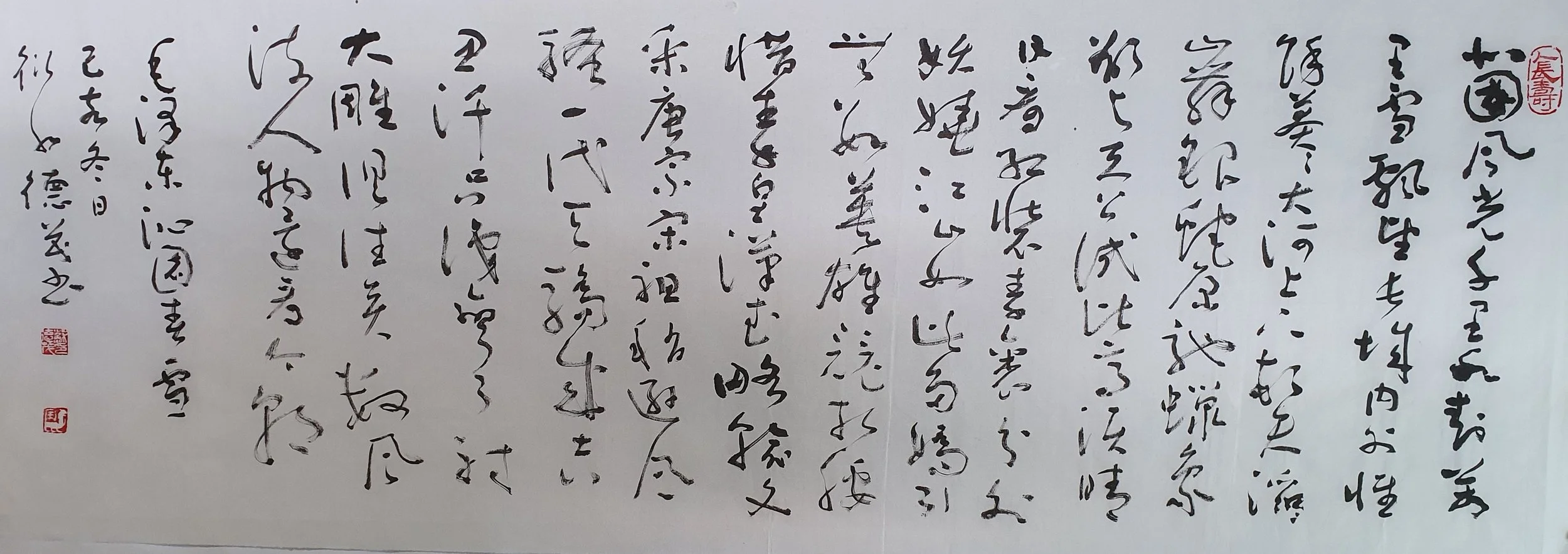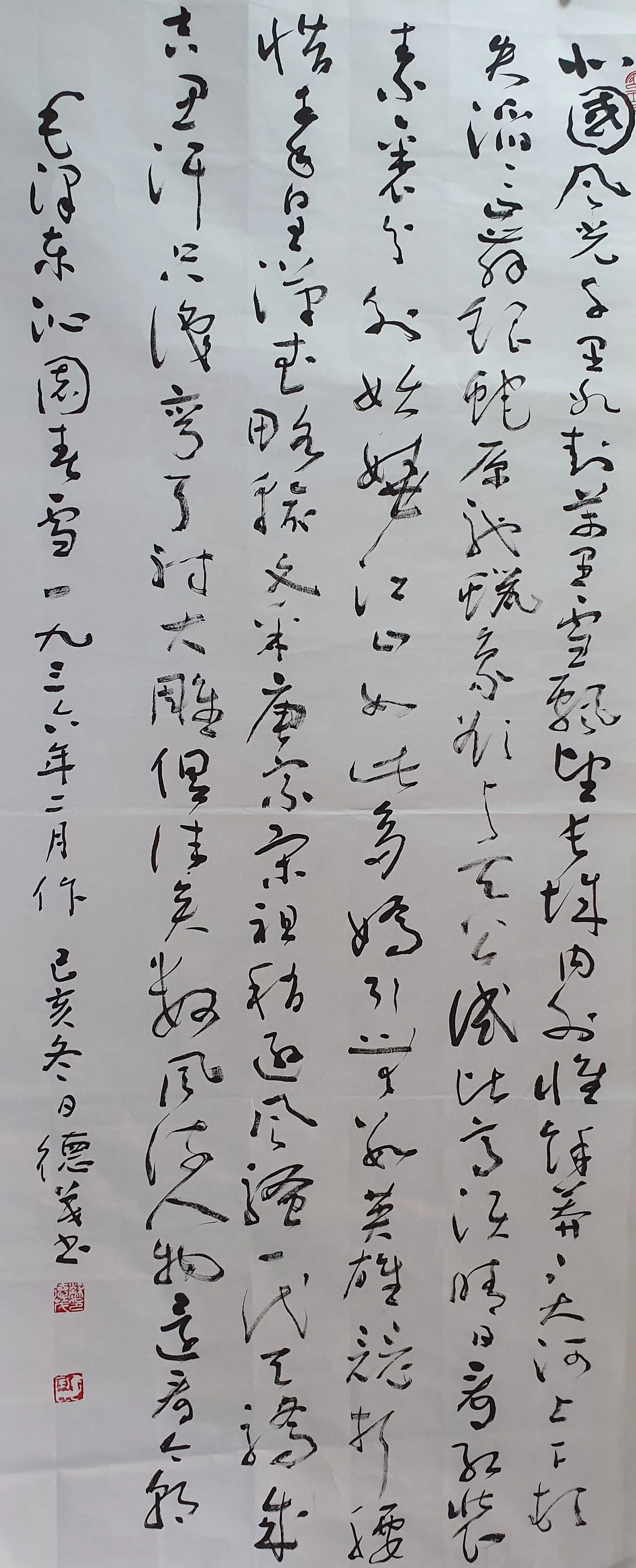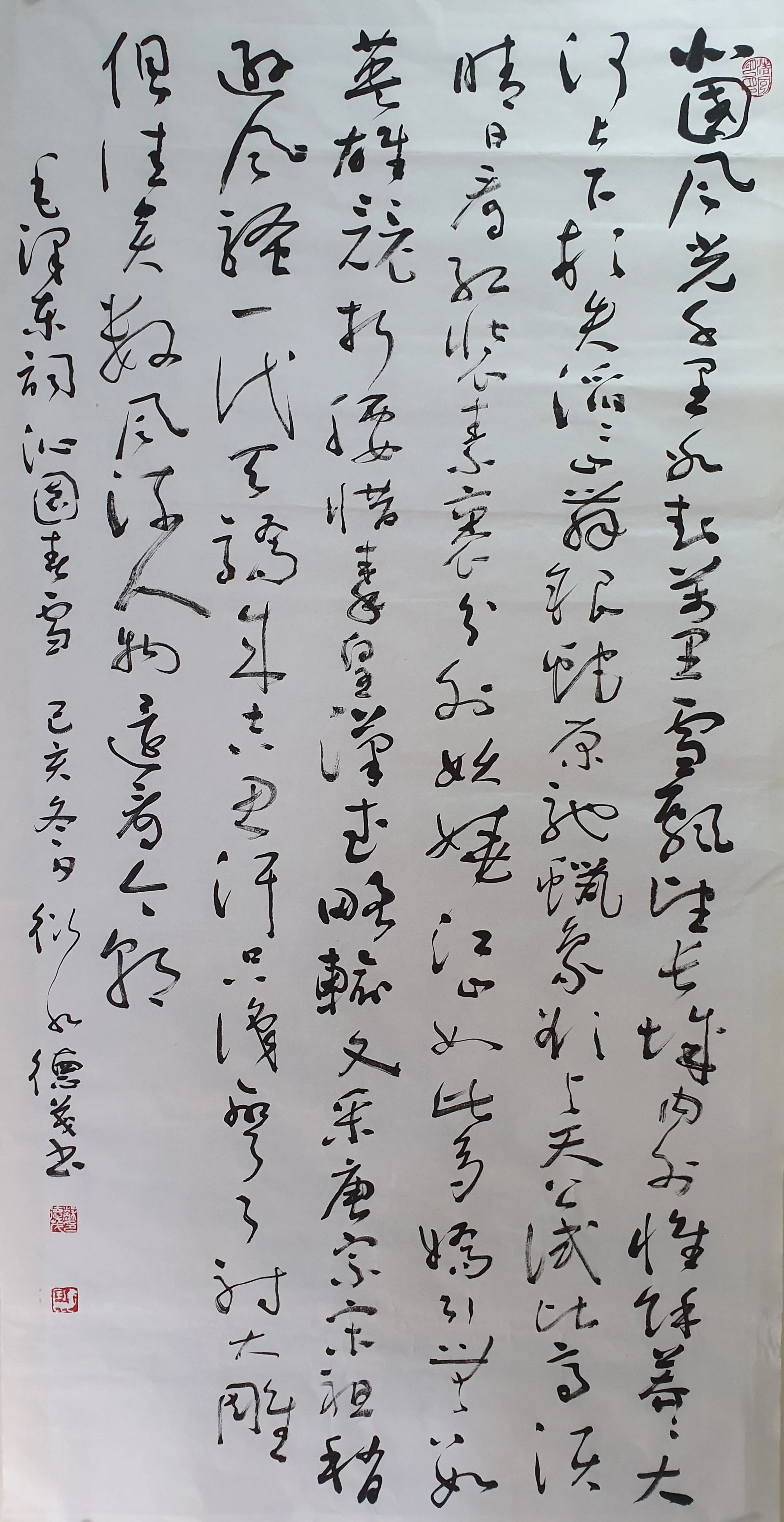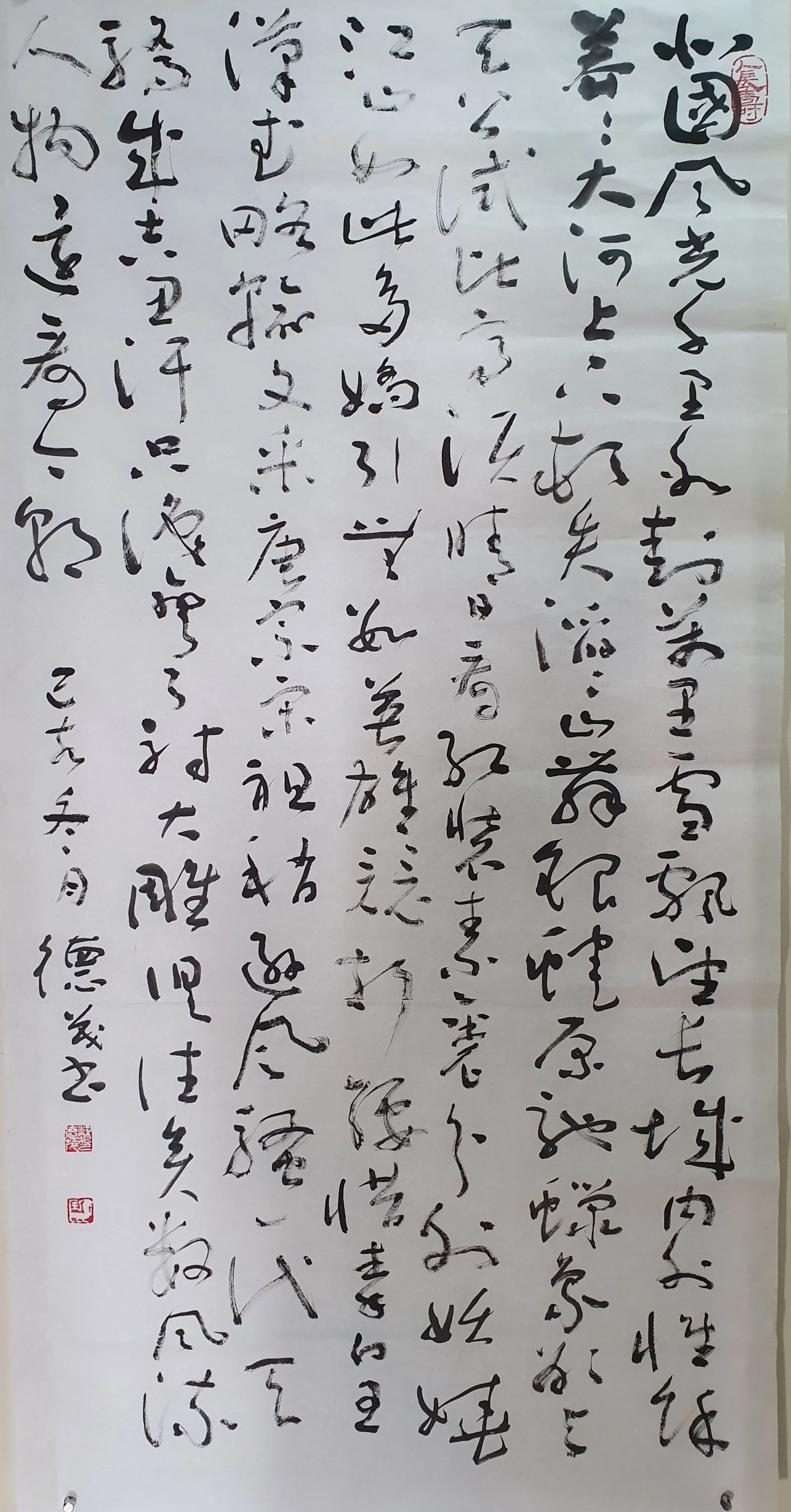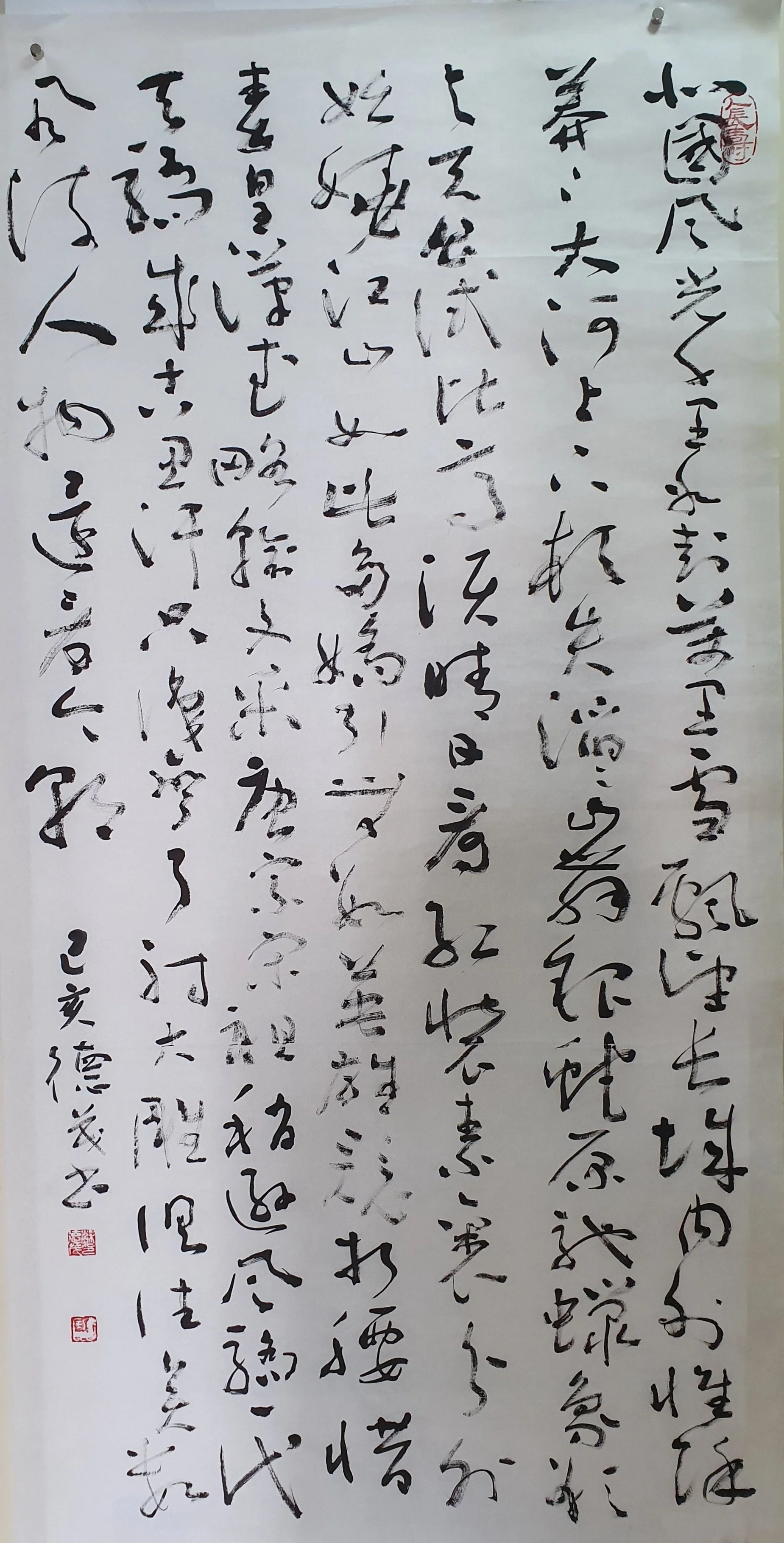历代词 (二)Classical Poetry of Various Dynasties
词的格式(称为调), 不同词牌,都有具体的要求。 不同调的词,字数原则上都有不同。句中断句的字数的多寡,平仄及是否对仗,皆有一定规定,通常按规定(规范)填词。固有“词谱”作为依据。
这里包括90个字以上的词作,通常称为长调。
The format of a Chinese song lyric, known as a "Diao," has specific requirements for each song style. Different Diaos have different guidelines for the number of characters in each line. The number of characters for the pause in the middle of the line, as well as the balance of tones and parallelism, are also subject to certain rules. Typically, these rules are followed when composing songs, according to the established "cipu" or rhyme schemes.
This section includes examples of classical poetries (more than 90 characters) calligraphed by Su Demao.
Do take note that in Chinese Calligraphy, words are read from right to left.
大江东去,浪淘尽,千古风流人物。
故垒西边,人道是,三国周郎赤壁。
乱石穿空,惊涛拍岸,卷起千堆雪。
江山如画,一时多少豪杰。
遥想公瑾当年,小乔初嫁了,雄姿英发。
羽扇纶巾,谈笑间,樯橹灰飞烟灭。
故国神游,多情应笑我,早生华发。
人生如梦,一尊还酹江月。
苏轼 念奴娇·赤壁怀古
The great river surges constantly, flowing eastward, and its mighty waves have washed away countless heroes and legends throughout history.
To the west of the old camp lies the Red Cliff, where people say Zhou Yu famously defeated Cao Cao's army during the Three Kingdoms period.
The rocky shore is dotted with jagged stones, piercing the sky, and the tremendous waves crashing against the riverbank create spray resembling a million heaps of snow.
The majestic landscape is like a painting, and in this moment, one can almost see the emergence of numerous heroes and legends.
Thinking back to the past, Zhou Yu was in his prime, with Xiao Qiao just married to him as his wife. He was handsome, energetic, and charming,
with a fan in his hand and a silk scarf on his head, and he effortlessly burned the enemy's warships to ashes.
Now, standing on the ancient battlefield, I am filled with nostalgia, as if my youth has passed me by and my hair has turned white prematurely.
Life is like a dream, and I raise a glass of spirit to honor the bright moon over the river.
Su Shi, "Recalling the Maiden's Lament and Reflecting on the Past at Red Cliffs"
北国风光,千里冰封,万里雪飘。
望长城内外,惟余莽莽;
大河上下,顿失滔滔。
山舞银蛇,原驰蜡象,欲与天公试比高。
须晴日,看红装素裹,分外妖娆。
江山如此多娇,引无数英雄竞折腰。
惜秦皇汉武,略输文采;
唐宗宋祖,稍逊风骚。
一代天骄,成吉思汗,只识弯弓射大雕。
俱往矣,数风流人物,还看今朝。
毛泽东 《沁园春·雪》
The scenery in the north is breathtaking, with thousands of miles of frozen ice and snowflakes drifting for tens of thousands of miles.
Looking inside and outside the Great Wall, all that can be seen is a boundless expanse of white.
The entire Yellow River has lost its roaring waters and has been covered in white snow.
The mountains covered in snow appear like silver serpents dancing, and the plateaus resemble white elephants running, as if they want to compete with the heavens for height.
When it clears up, the red sun and white snow reflect each other, creating a particularly beautiful and charming sight.
The country is so enchanting that it has drawn innumerable heroes to compete for its favor.
Unfortunately, Emperor Qin Shi Huang and Emperor Han Wu Di fell a little short in their literary accomplishments,
while Emperor Tang Tai Zong and Emperor Song Tai Zu were somewhat lacking in literary talent.
The hero who dominated the world, Genghis Khan, only knew how to shoot big eagles with a bow.
These figures are all in the past. To find heroes who can accomplish great feats, one must look to the present generation.
Mao Ze Dong, "Spring in a Small Town - Snow"
楚天千里清秋,水随天去秋无际。
遥岑远目,献愁供恨,玉簪螺髻。
落日楼头,断鸿声里,江南游子。
把吴钩看了,阑干拍遍,无人会,登临意。
休说鲈鱼堪脍,尽西风,季鹰归未?
求田问舍,怕应羞见,刘郎才气。
可惜流年,忧愁风雨,树犹如此!
倩何人、唤取红巾翠袖,揾英雄泪!
辛弃疾 水龙吟·登建康赏心亭
The vast autumn sky in the southern land is desolate and lonely for miles, and the river flows towards the horizon endlessly.
Looking into the distance at the mountains, it only brings me sorrow and indignation for the downfall of the country, as those mountains resemble the jade hairpins and coiled hair of a woman.
As the sun sets, the lone goose's mournful cries reflect the suppressed grief and indignation of a traveler on the balcony.
I fiercely beat the railings on the balcony after admiring this precious sword, but no one understands the feelings behind my ascension to the balcony.
Don't talk about the deliciousness of the fish, the autumn wind howls through the sky, and how could I, like Zhang Han of the Western Jin Dynasty, abandon my official position for the sake of indulging in the delicacies of my hometown?
If I were like Xu Ji, who only focused on buying property and seeking personal gain, I would probably feel ashamed and embarrassed when meeting the talented Liu Bei.
It is regrettable that time passes by and the country still faces turmoil, with no end in sight to the northern expedition, and the long-standing dream of restoring the Central Plains cannot be realized!
Whose handkerchief can I ask for, to wipe away my tears of grief,
Xin Qiji, “Climbing the Heart's Ease Tower in Jiankang”
寒蝉凄切,对长亭晚,骤雨初歇。
都门帐饮无绪,留恋处,兰舟催发。
执手相看泪眼,竟无语凝噎。
念去去,千里烟波,暮霭沉沉楚天阔。
多情自古伤离别,更那堪,冷落清秋节!
今宵酒醒何处?
杨柳岸,晓风残月。
此去经年,应是良辰好景虚设。
便纵有千种风情,更与何人说?
柳永 雨霖铃·寒蝉凄切
The autumn cicadas' cries are desolate and urgent. In the evening, facing the pavilion, the sudden rain has just stopped.
We set up camp outside of Kyoto for a farewell feast, but I have no heart to enjoy the drinks. As we cling to each other, tears in our eyes, the people on the boat urge us to depart.
I cannot speak through my choked sobs. I think of the long journey ahead, the misty and vast scenery, with no end in sight as the evening clouds shroud the sky.
Throughout history, sentimental people have always been saddened by goodbyes, especially in this bleak and desolate autumn season!
Who knows where I'll be when I sober up tonight?
Perhaps only by the banks of the willows, facing the bleak morning wind and the waning moon of dawn.
Even if I were to encounter good weather and beautiful scenery, I imagine it would feel like a mere illusion.
Even if there are countless moods and feelings, with whom can I share them now?
Liu Yong, “The Rain on the Plantain Terrace - The Sadness of the Cicada's Cry"

